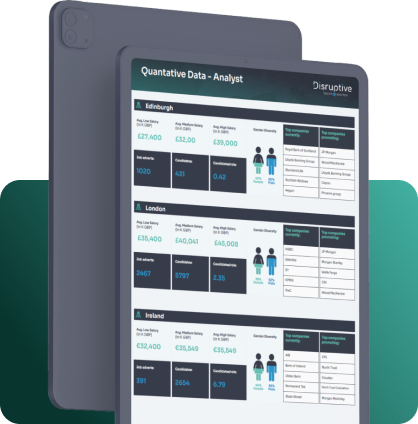On Episode 2 of The Disruptive Mindset Podcast, we welcomed the legendary Gary Harrison to the show and asked him all of our burning questions about the FinTech industry. Gary is the CEO of OARO, a global IAM solutions provider. We spoke about everything from Gary’s passion for FinTech to his biggest pet peeves. Read on for some of the highlights from that conversation.
What’s really grabbing your attention at the moment?
Technology has always been very interesting. Digitalisation is happening so rapidly out there, and the wave we’re going through at the moment is moving at a speed that we just haven’t seen before in our generation. The use of blockchain, API, cloud AI and robotics, and the way they’re being applied is absolutely phenomenal. The take up of this new technology in 2022 is just moving at a speed that I’ve never seen before. Within OARO, we’re pretty excited about a couple of aspects within it. One is around our eco friendly credentials within blockchain. As we know, one of the biggest issues that we have within the world at the moment is climate change and co2 emissions. If you look into the blockchain world, the amount of co2 that a blockchain creates is enormous. We’re leading the way in terms of having a carbon Net Zero blockchain, nobody else has got anything else like it within the marketplace. We’re particularly proud of our ESG credentials around our carbon net zero footprint. That and what we’re doing around it are what I’m particularly excited about.
What’s working well for you at the moment?
The tech space that we’re in is moving at a rapid rate of knots. That’s both a challenge and an opportunity. One of the propositions that we launched about 12 months ago was around non fungible tokens, or NFTs, which lends itself to the blockchain infrastructure very well. Now, I don’t know about you, but 12 months ago, I hadn’t really kind of come across NFT’s. Now you go and ask your hairdresser or your barber, or your cleaner, about an NFT and they will all know about NFT’s, they’ll all have a view around what an NFT is. I think it’s amazing. I’ve never seen a take up of a particular kind of technology proposition so quickly. The maturity of the NFTs is phenomenal too.
I think for OARO, it’s about creating highly valued and disruptive propositions within the NFT space. So yes, we do some tokenization around artwork in gaming, it’s a huge area of spend and interest within NFT’s. For me though, that’s not really what the technology is about, for me it’s about where it’s going. We’re trying to make lives easier and take friction out of processes. We’ve really applied the tokenization elements of NFT’s around the digitalization of certificates from all of them, for want of a better word. A couple of examples of where we’ve deployed it and where we’re rolling it out are the banking and capital markets, particularly in the structured products commodity section. It’s a really interesting kind of asset class within banking, which is very paper driven, very manual, very legacy-based or very high touch-point oriented. We’ve taken eyes off those contracts, so you’re able to trade those contracts openly on an NFT platform. Say for example in agricultural commodities trading, we’ve tokenized the crop in the field and that crop yields and grows. So does that NFT token, it grows, then you’re able to change that token on an NFT trading platform. What it really does is turn a relatively illiquid asset class into a liquid asset class overnight.
The other areas where we’ve applied that process is in the real estate space, especially for first time buyers where it’s much more difficult to get onto the property ladder. There was a time when it wasn’t too difficult to get onto the property ladder. Now, as a student coming out of university, trying to get on there is remarkably different. But imagine if you could fractionally tokenize a property, so you could own a percentile of that property. It gives you a foot onto that property ladder. But again, you can also trade on that percentage of your ownership for particular property as well. So for example, 1 Hyde Park is completely out of our pricing range, but imagine if you fractionally tokenize 1 Hyde Park, you could own 1000ths or 100,000ths of 1 Hyde Park in the centre of London. You had that as an investment vehicle to move forward with, you’re able to have that foothold within the property sector. We’re seeing a huge area of demand going out in the last year with a first of a kind proposition, and both of those examples that I’ve given you are in two very high growth markets. We’re seeing a huge amount of take up within those types of propositions.
It sounds like the investment world is completely changing, it’s not just for the few that know about it anymore, it’s actually enabling others to get involved. Would you say that’s accurate?
That’s right. Another great example would be if you’re into wine, we’ve just set up an NFT white wine trading platform for a very large Argentinian Vinyard. You can invest in the crop for new yields of wine or in bottles of high end wine that’s put into storage, and you can use those as an asset or a funding vehicle. There’s lots of different areas and cases in which you can apply this from an ESG perspective. We’ve just done some really exciting work with a large global real estate business. That’s also a huge chunk of the Amazon Rainforest that’s been fractionally tokenized, so you’re able to buy a piece of the Amazon rainforest now to try and protect it and stop the further development and building of it. There are so many different use cases around it. One of the biggest issues around real estate is financing it. What we were also able to do through NFT technology was set up a financing platform. So if you wanted to own number 2 Hyde Park or if you wanted to go and invest in the Amazon Rainforest, you could help finance it and fund an infrastructure project programme, which is achievable through tokenization.
It also has wider applications. Canada is using our blockchain and the NFT technology and biometrics that we call a seamless ticketless travel experience. I don’t know about you, but when I go through an airport, it can be quite tiresome. You go through the doors, you get your passport out, you show it to the check in desk, you fumble around trying to find your ticket, you then go through security, your passport comes out again, your ticket comes out again, you get to the lounge, your ticket comes out again… In our process we’re using our biometrics so you can now travel seamlessly through most of Canada’s airports by only stopping once to show your passport as you go into that airport. The use of auto technology is creating a huge amount of value for lots of people out there through the use of our technology, which is quite exciting.
To hear more about Gary Harrison’s insights into the development of technology in the finance sector tune into the full episode of The Disruptive Mindset Podcast on Spotify here and Apple Podcast here.


How Disruptive is your Leadership Hiring?
Find out where your management team’s weaknesses are and how you could improve your hiring strategies with this free 5 minute questionnaire.
Contact Us
"*" indicates required fields
